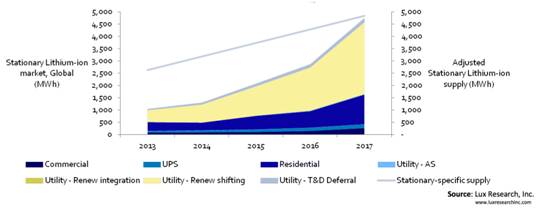Lithium-Ion Batteries Find Niche in Backup Storage, UPS

Led by lithium-ion (Li-ion), emerging battery technologies used in the backup and uninterruptible power supply (UPS) markets will grow six-fold from $143 million this year to $896 million in 2020, according to Lux Research. Li-ion batteries will account for a bulk of this market, reaching $553 million in 2020, and additionally restoring demand-supply balance in the Li-ion market, according to Lux Research’s report Backup and UPS: Stable Growth in the Unstable Stationary Storage Markets.
Medical, commercial and data center operators are the major users of the conventional backup and UPS markets, which have a global installation base of 800 GW, or 15 percent of global peak consumption. The Li-ion chemistry offers enhanced life and power density over incumbent lead acid systems, according to LUX.
Other conclusions from the report include:
- As lithium-ion developers struggle to find large-volume customers, the UPS and backup markets offer a chance for steady growth. The sector will add 12.5 percent to global demand for stationary lithium-ion systems. The Li-ion developers, in return, offer a 4 percent to 11 percent reduction in total cost of ownership over competing lead acid.
- The sodium nickel chloride battery, which offers significant cost benefits for high-use applications on account of its low capital cost and significant energy capacity, will grow to $116 million in the backup market in 2020. On the other hand, power-dense technologies including flywheels and ultracapacitors will not find a home in UPS because of their low energy density and prohibitive cost.
- Of the 14 GWh of forecasted Li-ion production in 2017, only 5 GWh will target stationary applications, thanks to demand from the consumer and mobile sectors. This will help strike a delicate balance between global supply and demand, ending years of oversupply and eroding margins.
Recently, power management products firm Xtreme Power unveiled its new 1 MW lithium ion-based battery energy storage system for Texas’ Center for the Commercialization of Electric Technologies.
Energy Manager Today - Copyright ©2013, all rights reserved.
http://www.energymanagertoday.com/lithium-ion-batteries-find-niche-in-backup-storage-ups-096368